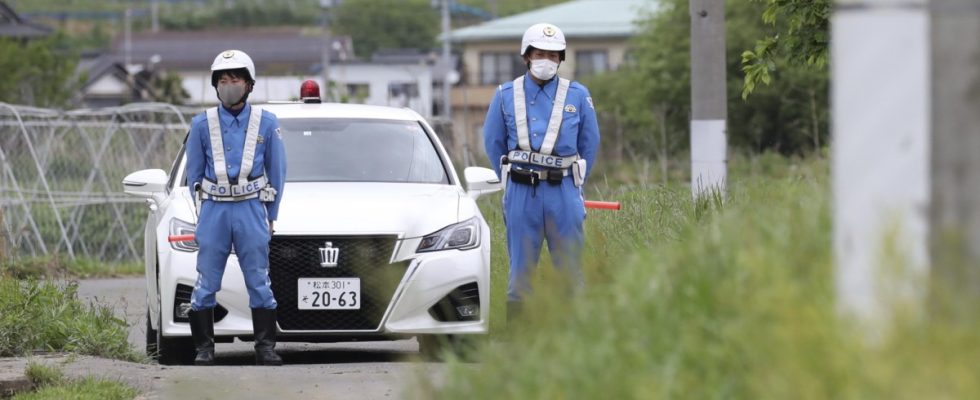Masanori A. appeared to be laughing as he shot the police officers. The broadcaster NHK reports this with reference to witness statements, and this is another bizarre detail of this already bizarre bloody deed by Nakano in the Japanese prefecture of Nagano.
There wasn’t really anything going on on Friday afternoon in the area around the farmhouse where A. lived with his parents and aunt. Except that in the rural district of Ebe, two elderly women went for their usual walk along the narrow road that runs past the fields.
But then a neighbor working in his garden saw one of the walkers running, as Masanori A., 31, caught up with her and stabbed her several times with a knife. Another man who was nearby was trying to revive the woman when a police car arrived. He saw Masanori A. with a hunting rifle. A. fired into the car.
“Lone Wolf Terrorism”
Four people died in Nakano last Friday afternoon: both walkers, Yukie Murakami, 66, and Yasuko Takeuchi, 70, as well as police officers Takuo Ikeuchi, 61, and Yoshiki Tamai, 46. And no one really knows why.
Masanori A. gave up after hiding in the family home for twelve hours. The newspaper Asahi reports that his father, a well-known city politician, spoke to him. A. is said to have said: “I thought that people were talking badly about me because I was always alone. I was thinking of a certain woman, so I stabbed her.” But that doesn’t really explain the extreme violence.
Japan has a problem with a small group of misfits who develop destructive energy in their frustration. Nakano’s case is not the first of its kind.
Japan is actually a safe country. Strict gun laws contribute to this, certainly also the education of the locals to become citizens who move quietly in the current of the collective society. Nobody should disturb, everyone should fulfill their assigned role without complaint. Almost everyone does that too. But if you can’t swim with the current, if you offend, you can feel very lonely here. Individuals seem to be so resigned that they don’t care about the lives of others.
“Japanese-style lone wolf terrorism,” was how criminal psychologist Masayuki Kiriu from Toyo University in Tokyo called the phenomenon last year in the Jiji news agency. Back then, in July 2022, the unemployed Tetsuya Y. had just shot dead former Prime Minister Shinzo Abe at a campaign event in Nara.
Apolitical, ideology-free individual perpetrators
Y. explained after the fact that he wanted to take revenge on the new Unification Church religious movement because their donation practice had ruined his mother; Abe had connections to the church.
The Nakano murders are a completely different story, but they also fit into Kirius’ image of Japanese terrorism: extremist groups do not carry out attacks on states, groups or institutions, as is the case with international terrorism – but rather non-political, ideology-free individual perpetrators on fellow human beings or institutions that derive from their are to blame for something.
It was the same in December 2021 when a man set a fire at a clinic in Osaka. 25 people died, and later the alleged perpetrator himself. In his apartment, the police found, among other things, an article about an arson attack in Kyoto in July 2019. At that time, a 41-year-old ex-convict set fire to the Kyoto Animation studio because it allegedly had used a story of his without being asked. 36 people died.
In early 2022, a 66-year-old man shot and killed a doctor in Fujimino, Saitama Prefecture, for failing to revive his dead mother. In December 2022, the police in Hanno, also in Saitama Prefecture, arrested the 40-year-old unemployed person Jun S., who was living alone on strong suspicion of having killed his American neighbor, his wife and his daughter. The American, who had lived in Japan for a long time, had previously reported S. three times for property damage.
One could list more. In April, Prime Minister Fumio Kishida could have been killed when a 24-year-old threw a bomb at him during a campaign appearance in Wakayama. The bomb didn’t explode immediately, there were no casualties – but that was another act from Japan’s unfathomable depths. And now Nakano.
Masanori A. is said to have been a taciturn man who was rarely seen. His father stated that his son had social problems and therefore worked on the family farm’s fields. He was a marksman, a member of the hunting club, and held licenses for four hunting rifles. And Masanori A. loved his dog. He often let him run free. That’s why he got in trouble with the neighbors.

